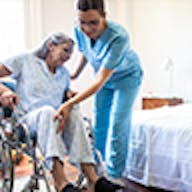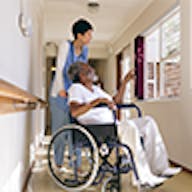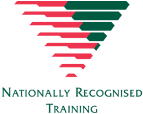Kick-start your career in healthcare with a HLT33115 Certificate III in Health Services Assistance
Are you passionate about helping people? Do you want to make a real difference in your community while setting yourself up for a successful and exhilarating career pathway? An occupation centred around working as a health services assistant might be your calling.
Pursuing a patient care course such as the HLT33115 Certificate III in Health Services Assistance opens up a diverse range of career opportunities. The qualification provides you with the factual, technical and procedural knowledge required to provide assistance to healthcare professionals. Whether it’s learning what you need to comply with infection prevention and workplace health and safety (WHS), honing your skills on how to communicate effectively in a healthcare and community services setting or understanding how to interpret and apply medical terminology accurately, the online health services assistance course will ensure you’re fully prepared to work as a health services assistant no matter what area you decide to go into.
Completing the health services assistance course opens a variety of career opportunities. Graduates may go on to work as an assistant in nursing, a patient care attendant, patient support assistant, patient services assistant or a patient services officer. It’s the ideal certification for those looking to work in a more hands-on role in patient care under supervision.
Foundation Education offers an online HLT33115 Certificate III in Health Services Assistance, which can be completed in just 12 months or less. By taking this nursing assistant course, you'll gain the qualifications necessary to work in a variety of health services assistance positions. According to Job Outlook, the healthcare and social assistance sector is Australia’s largest and fastest growing industry.
Interested in what other roles are possible in the healthcare industry? Become a health administrator with a HLT37315 Certificate III in Health Administration or work as a practice manager in a health institution with a HLT57715 Diploma of Practice Management.
The HLT33115 Certificate III in Health Services Assistance is a Nationally Recognised course.
Course Outcomes
Completing the HLT33115 Certificate III in Health Services Assistance, a nursing assistance course, equips you with the expertise and knowledge needed to excel in roles focused on health services assistance and client care. Throughout this health assistance course, you will acquire essential skills that apply to various job opportunities. These skills encompass effective communication, compliance with workplace health and safety (WHS) and infection prevention protocols, proficiency in medical terminology, and the ability to work respectfully, safely, and supportively with individuals facing mental health and substance abuse challenges.

Assistant in Nursing
Delivers limited care to patients under the direction of Registered Nurses. They are responsible for helping patients with their day-to-day routines such as showering, dressing, eating, mobility and medication. They keep accurate patient records and help with the planning of their ongoing care and daily routines.

Patient Care Attendant
Supports patients with basic cleaning and dressing needs and administers medication. When working in a patient’s home, they often attend to basic housekeeping duties the patient is unable to perform. They are responsible for keeping the patient company and monitoring changes to their physical, emotional and mental condition.

Patient Support Assistant
Responsible for taking care of a patient’s basic needs. They assist patients with several hygiene tasks including bathing, dressing, feeding them and helping them use the toilet if needed. They monitor and record vital signs such as temperature, pulse and blood pressure and report any health concerns the patients may have to the nurses.

Patient Services Assistant
This role is primarily carried out in a hospital environment. It involves performing a diverse range of tasks including assistance with general patient care, patient transport, cleaning and food services. The responsibilities of a patient services assistant may vary depending on the institution they are working for and the specific role they are in.

Patient Services Officer
Provides courteous and efficient patient support to staff, patients and clinicians. Their duties include obtaining the required medical records, organising patient transport bookings, managing telephone inquiries and providing general administrative support as needed.
Certificate III in Health Services Assistance
Delivery structure
Theoretical Elements:
Study the theoretical elements of this course, anywhere and anytime through our online learning platform.
Up to 12 months
Study load
- 15 course units to complete.
- Complete one course unit every 3 weeks to graduate in 12 months.

Delivery Structure
Studying the Certificate III in Health Services Assistance with Foundation Education is flexible and can be tailored to suit your needs.
1. Theoretical
Study the theoretical elements of this course, anywhere and anytime through our online learning platform.
Components
15 units to complete.
Completed online, at your own pace.
Resources required
To successfully complete this course, it’s essential that your placement provider has the necessary equipment, resources and/or documentation. For detailed information on these requirements, please reach out to our friendly Career Advisors to obtain a copy of the complete list.
For the online part of the course, you’ll need regular access to:
Computer: Laptop or desktop computer with working speakers or headphone points.
Internet: High-speed internet such as Broadband or ADSL, T1/T2, fibre optic (Dial-up access is not recommended).
Windows: Operating system – Windows 8 or above.
MAC: Operating system - OS X 10.14 Mojave or later.
Internet browser: Google Chrome, or Microsoft Internet Explorer 11.
Software: Flash, Adobe Reader, Microsoft Word (or Open Office which is free to download).
Office equipment: Printer and scanner to print and upload some of your assessments.
Mobile phone with video capability or video camera: Some assessments in your course may require you to take and submit videos of you undertaking tasks for assessment.
Units
Achieve your qualification by completing the following units of competency:
Certificate III in Health Services Assistance
Cost and payment
You can pay for your course upfront via VISA/MasterCard or a bank deposit. Alternatively, we offer instalment plans that can be paid over several weeks or fortnights.
Your course fee includes
Delivery and assessment of your qualification
Study materials (including all resources)
Ongoing support from our Education Team
We offer two payment methods
Full fee upfront
Instalment plans
For more information about the course costs, please call us on 1300 616 197.
You May Also Be Interested In
BSB30120
Certificate III in Business (Medical Administration)
Enhance your organisational and administrative skills to become a highly sought-after Medical Receptionist or Secretary, Records Clerk, or Accounts Clerk.
HLT47321
Certificate IV in Health Administration
Advance your career by gaining the skills to lead a health administration team as a Senior Admissions Clerk or Medical Records Section Leader.
HLT43021
Certificate IV in Allied Health Assistance
Support Allied Health professionals to improve the wellbeing of patients in a variety of Allied Health settings.






